Collaboration
Research Collaboration
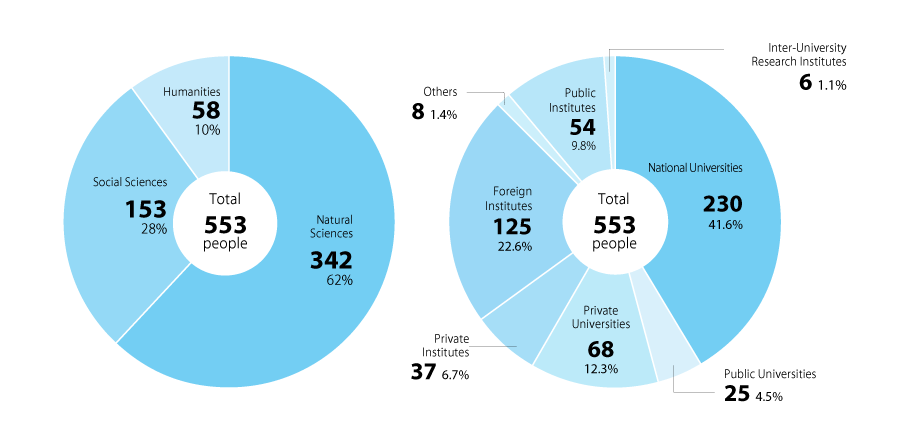
*As of March 31st, 2021
Collaboration in Japan(*As of May 1st, 2021)
Research Institutions
- Graduate School of Environmental Studies, Nagoya University
- Doshisha University
- Nagasaki University
- Kyoto Sangyo University
- Tottori University of Environmental Studies
- Kyoto University
- Center for Environmental Remote Sensing, Chiba University
- Institute of Nature and Environmental Technology, Kanazawa University
- Faculty of Engineering, GI-CoRE, Faculty of Health Sciences, Research Faculty of Agriculture, Hokkaido University
- Graduate School of Arts and Sciences, The University of Tokyo
- Graduate School of Life Sciences, Tohoku University
- Faculty of Collaborative Regional Innovation, Ehime University
- Kyoto Seika University
- The Institute of Statistical Mathematics
- Nara Women's University
- University of the Ryukyus
Municipal Governments and Other Agencies
- Saijo City (Emime Prefecture)
- Kyoto Municipal Science Center for Youth
- Food and Agricultural Materials Inspection Center (FAMIC)
- Ono City (Fukui Prefecture)
- Kameoka City (Kyoto Prefecture)
- Kyoto Prefectural Hokuryo Senior High School
- Kyoto Prefectural Rakuhoku Senior High School
- Miyazaki Prefecture
- Noshiro City (Akita Prefecture)
- Kyoto City, ICLEI Japan, Kyoto Environmental Activities Association
- Kyoto Institute, Library and Archives
- Oshino Village (Yamanashi Prefecture)
- Kyoto Prefecture, Kyoto City
International Collaboration
Memoranda of Understanding and Research Cooperation Agreements (*As of April 1st, 2019)
| AUSTRIA | International Institute for Applied Systems Analysis |
|---|---|
| BHUTAN | College of Natural Resources, Royal University of Bhutan |
| BURKINA FASO | l'Association des Jeunes pour la Protection de l'Environnement et d’Elevage |
| CAMEROON |
|
| CHINA |
|
| GERMANY | Institute for Advanced Sustainability Studies |
| INDONESIA |
|
| LAOS | Lao Tropical and Public Health Institute, Ministry of Health |
| MYANMAR |
|
| NETHERLANDS | Copernicus Institute of Sustainable Development, Utrecht University |
| OMAN | Sultan Qaboos University |
| SWEDEN | Stockholm Resilience Centre at Stockholm University |
| UNITED STATES OF AMERICA | University of California, Berkeley |
| ZAMBIA | University of Zambia |
▲PAGE TOP
Ecohealth
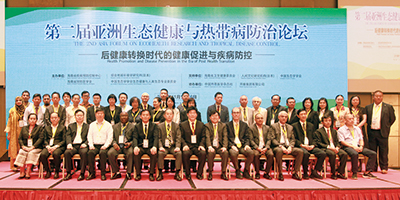
2nd Asia Forum on Ecohealth Research
(Organized by NIHU Multidisciplinary Collaborative Project Ecohealth Resarch, Hainan Provincial Center for Disease Control and Prevention, Eco-health & Human Ecology Committee, the Ecological Society of China in Hainkou City, China, Nov 2019)
New Development of Ecohealth Research in Asia
This project is a collaboration with the National Museum of Ethnology and the National Institute of Japanese Literature, supported by the National Institutes for the Humanities. It adopts an Ecohealth approach that places human health in a wider ecosystem context and explores the linkages among livelihoods, food and subsistence, ecological environment and demographic and social change in Asia. Through historical examination of concepts of health in East Asia and contemporary fi eldwork in communities in Laos, China and Japan experiencing rapid demographic change, the project aims to move beyond disease-oriented understandings to a holistic and positive appreciation of health in specifi c contexts and places.
▲PAGE TOP
Future Earth
RIHN hosts the Future Earth Asia Regional Center (https://asiacenter.futureearth.org/), that supports development of Future Earth in the region, helps connect researchers and other stakeholders, and facilitates the formation of regionally relevant and credible governance structures for the initiative. The Center has convened a Regional Advisory Committee to accelerate the regional development of Future Earth and collaborated in supporting various Future Earth programs focused in Asia: Monsoon Asia Integrated Research for Sustainability – Future Earth (MAIRS-FE), Sustainability Initiative in the Marginal Seas of South and East Asia (SIMSEA) and Health Investigation and Air Sensing for Asian Pollution (Hi-ASAP). The Center supports the Knowledge-Action Network on “Systems of Sustainable Consumption and Production” (https://sscp.futureearth.org/),hosts the TERRA School, a course on Transdisciplinarity for Early careeR Researchers in Asia and facilitates Science-Based Pathways for Sustainability initiatives in the region. TERRA School participants went through lectures and interactive group works using Miro and other online platforms. On the last day of the program, each group presented a proposal for a transdisciplinary research project.
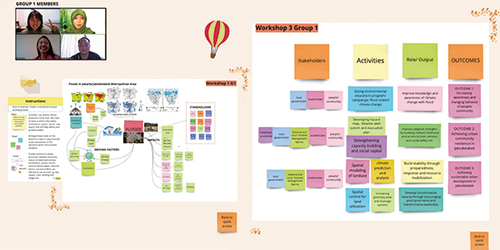
The Future Earth KAN-SSCP International Mini Conference "COVID-19 and Sustainability Transitions" was held online on 27 May 2020. More than 150 researchers and practitioners participated from all over the world.
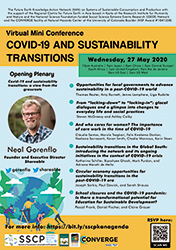
The Future Earth KAN-SSCP International Mini Conference "COVID-19 and Sustainability Transitions" was held online on 27 May 2020. More than 150 researchers and practitioners participated from all over the world.
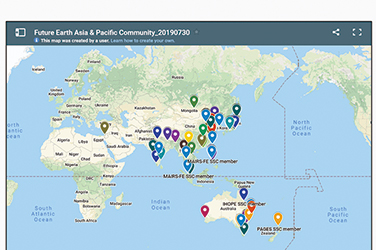
Future Earth Asia Regional Centre Website: A map of the Future Earth Community in Asia has been developed. This map shows people and institutions in the region that are actively engaged in Future Earth activities. (https://asiacenter.futureearth.org/)
Environmental Education
This unit promotes environmental education for public school students from primary to secondary levels. It coordinates school tours to RIHN, where students visit laboratories and research project workspaces, and can speak directly with lab technicians and scientists of many different disciplines and specializations. It also conducts teachertraining activities in order to convey updated perspectives and methods in environmental science. The practice of environmental education also stimulates RIHN to revisit its own practices in global environmental science. Environmental education therefore plays an important part in RIHN’s mission to work with different social actors—from individual students and teachers, to entire schools and school districts, and beyond—to develop knowledge that enhances public understanding of and engagement with the contemporary environment.
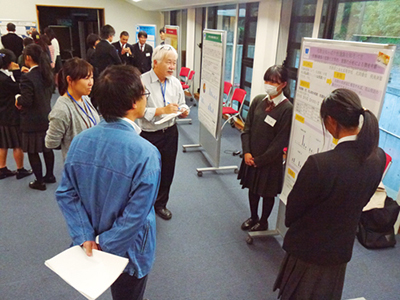
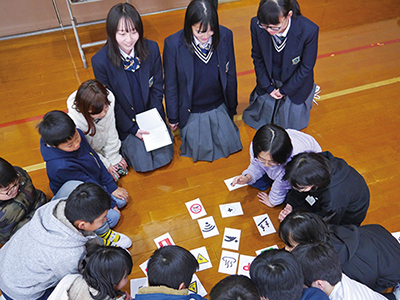
Interactive Communication Initiative
This NIHU-RIHN initiative seeks to improve environmental communication through creative visualization projects. It uses transdisciplinary methods to develop a range of visualization exercises and techniques, including videos and exhibitions, that improve bi-directional communication about the nature of environmental problems. Visualizations thus provide an opportunity to improve the methods of transdisciplinarity, and to co-design sustainable futures based on a holistic understanding of people, societies, and the natural environment.

A model of a school lunch of the year 2050 (courtesy of Maximilian SPIEGELBERG).
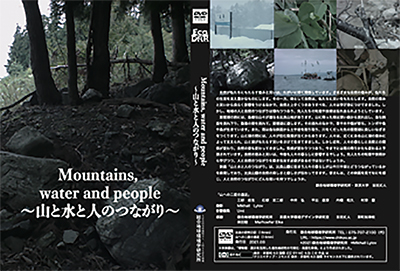
"A short movie titled Mountains, Water and People (courtesy of YOSHIDA Takehito and Mikhail LYLOV)

